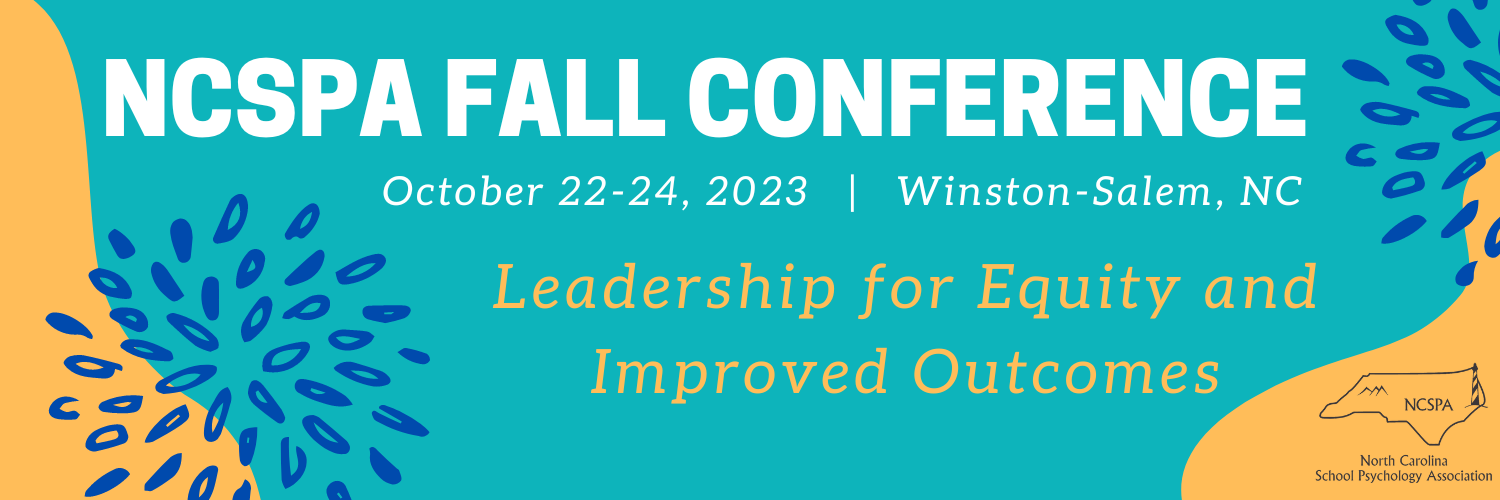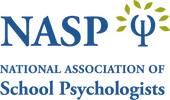|
|||||||||||||||||||||||||||||||||
In-person participants have the option of participating in any of the sessions.
|
|||||
In-person |
Virtual |
||||
| 9:00 am - 5:15 pm Bilingual Evaluation for Bilingual and Non-Bilingual School Psychologists: An evidence-based approach for all practitioners Sam O. Ortiz, PhD |
9:00 am - 12:15 pm Scientific Bases of Mathematics Instruction: Avoiding Myths, Embracing Evidence, & Advancing Student Learning Amanda M. VanDerHeyden, PhD |
9:00 am - 10:30am It's Time to Unite: Integrating Pre-K into a District's MTSS Framework Sarah Kelly, MA/CAS |
9:00 am - 10:30am One More Thing: The Role of Internship on the Path to Becoming a School Psychologist Charles A. Barrett, PhD, NCSP |
9:00 am - 10:30am Executive Function Assessment in School-Based Settings Elizabeth M. Power, EdD |
9:00 am - 10:30am What does the 2023-2024 Futures Conference mean for North Carolina? Lori E. Unruh, PhD |
| 10:45 am - 12:15 pm Addressing the Youth Mental Health Crisis: Best Practices in Assessment Rebecca M. Whalen, MA, CCC-SLP |
10:45 am - 12:15 pm |
10:45 am - 12:15 pm Sex Trafficking: Identification and Response Melinda Sampson |
|||
Session Descriptions & Learning ObjectivesUnless otherwise noted, each session meets criteria for NASP and APA approved credit hours. |
Bilingual Evaluation for Bilingual and Non-Bilingual School Psychologists: An evidence-based approach for all practitioners.
Sam O. Ortiz, PhD
Professor of Psychology and Director of Graduate Programs in School Psychology, St. John's University
Participants will be able to:
- Explain the advantages and limitations of traditional approaches to evaluation of individuals from diverse backgrounds including alteration or modifications in test administration, use of nonverbal tests, and native language evaluation procedures.
- Evaluate current research in the evaluation of the extent to which the validity of various assessment approaches and test results are undermined by cultural and linguistic factors.
- Apply the basic steps and process involved in conducting comprehensive and systematic evaluation of culturally and linguistically diverse learners.
- Utilize the contemporary, evidence-based for addressing exclusionary criteria in evaluation and establishing valid scores for measurement of language development.
- Establish and defend the validity of obtained test scores and other data by excluding the primary influence of cultural and linguistic variables.
- Interpret standardized test and other data in a nondiscriminatory and equitable manner.
- Select and use appropriate data for use in disability identification including PSW analyses.
- Conduct evaluations that meet best practice standards with ELs regardless of bilingual capability.
Scientific Bases of Mathematics Instruction: Avoiding Myths, Embracing Evidence, & Advancing Student Learning
Amanda M. VanDerHeyden, PhD
President and Founder, Education Research & Consulting and SpringMath
Educators operate at the intersection of evidence-based principles and frontline realities in schools. Thus, we can be key actors in reducing tension when philosophies are pitted against evidence and assist schools to adopt and deliver more effective instruction at scale. Science of Reading (SoR), Science of Math (SoM), MTSS, and equitable practices are mutually supportive: each attempts to institutionalize the premise that (a) learning is a predictable outcome of highly effective instruction and (b) implementing highly effective instruction in all classrooms is possible with the right resource allocations and commitment to science over philosophy. This session will detail key scientific findings pertinent to teaching math. Dr. VanDerHeyden will talk about leading a school toward adoption of science-based math instruction in classrooms. MTSS is a model that promotes growth for all learners and produces a dataset that can be used to inform future instructional actions. When risk is high, classwide math intervention is a necessary feature of MTSS (Tier 1.5) that has the effect of lowering overall risk (i.e., improving overall proficiency), closing opportunity gaps, and providing much more accurate identification of students needing more intensive intervention. Classwide intervention produces a strong incremental cost effectiveness ratio meaning that it produces benefit to all students in a highly efficient way. This session will detail how to use classwide math intervention in your MTSS models. Sample protocols and printed and video resources will be provided. Dr. VanDerHeyden will then take attendees from the risk decision to diagnostic assessment to an intensified math intervention aligned with the student's measured learning needs (Tiers 2 and 3). Implementation support will be detailed and evaluation of intervention success (RTI) will be unpacked to inform eligibility decisions.
Participants will be able to:
- Explain the primary features of science-based instruction in mathematics (and which popular but ineffective activities should be avoided or minimized)
- Describe effective screening and progress monitoring in mathematics, especially the need for sensitive mastery measures to make MTSS decisions.
- Situate classwide intervention as both a screening device but also an especially high-yield way to improve learning outcomes schoolwide.
- Build intensive individualized intervention in math using what we have learned from research in MTSS over the last two decades
- Use implementation science to drive MTSS
It's Time to Unite: Integrating Pre-K into a District's MTSS Framework
Sarah Kelly, MA/CAS, School Psychologist, Guilford County Schools
Amy Geer, Early Learning Coordinator, Guilford County Schools
Participants will be able to:
- Discuss how a multi-tiered framework can include comprehensive supports for PreK students
- Share new knowledge of research-based resources and data-based problem solving for supporting PreK students across tiers of support‚
- Identify and address barriers to implementation within a large school district
One More Thing: The Role of Internship on the Path to Becoming a School Psychologist
Charles A. Barrett, PhD, NCSP
President, CAB Publishing Company, LLC
Participants will be able to:
- Apply for internship and identify potential barriers and considerations within application and interview processes
- Discuss future career prospects upon completion of training
- Engage in discourse surrounding how to transition from an intern to an early career professional
Executive Function Assessment in School-Based Settings
Elizabeth M. Power, EdD
School Psychologist, Montgomery County Public Schools
Participants will be able to:
- Identify formal and informal executive function assessments they can use in their own practice
- Explore real-world case studies from individuals in grades K-12 with executive function deficits
- Discuss the implications of various executive function deficits for the K-12 school setting
What Does the 2023-2024 Futures Conference Mean for North Carolina?
Lori E. Unruh, PhD
Associate Professor, Western Carolina University
Participants will be able to:
- Share highlights from their initial experiences with the 2023-2024 Futures Conference.
- Discuss how the information from the 2023-2024 Futures Conference could influence future school psychology practice in North Carolina
- Develop plans for identifying actions at the individual and state level in response to the 2023-2024 Futures Conference
Addressing the Youth Mental Health Crisis: Best Practices in Assessment
Rebecca M. Whalen, MA, CCC-SLP
Assessment Consultant, Pearson Clinical Assessments
Participants will be able to:
- Use expanded and comprehensive assessment and data collection procedures to implement improved identification and classification of students who exhibit mental health difficulties and/or social maladjustment.
- Choose and utilize narrow-band assessments that differentiate between various emotional and behavioral challenges such as anxiety or depression.
- Demonstrate how progress monitoring is used for students receiving special education services, as well as those requiring emotional and behavioral support of all tiers in an MTSS framework.
Sex Trafficking: Identification and Response
Melinda Sampson
NC Stop Human Trafficking
This session will introduce attendees to the reality of human trafficking among the student population, behavioral issues associated with victimization, best communication practices, as well as vulnerabilities associate with the commercial sexual exploitation of children.
Participants will be able to:- Describe vulnerable populations and best communication practices
- Identify and respond to students who have been or are in danger of being exploited
AI Unplugged: ChatGPT's Guide to Writing Psychological Reports
Jake Finan, EdS - Wake County Public School System
ChatGPT
"Join us in this captivating presentation as we explore the intersection of cutting-edge technology and the world of psychoeducational reports. Dive into the fascinating world of AI language models, featuring ChatGPT as our esteemed presenter, and witness the magic of generating live interpretations for hypothetical psychoeducational assessment results. Discover the benefits, limitations, and ethical considerations of utilizing AI in report writing, and engage in a thought-provoking group discussion to navigate the future of AI in the field of School Psychology. Get ready for a delightful blend of innovation, humor, and professional insights, as we unveil 'AI Unplugged: ChatGPT's Guide to Psychoeducational Reports." ~ChatGPT (Session Presenter)"
I'm skeptical about whether or not letting language models write our reports for us is a good idea, so I decided to let ChatGPT try to convince me of the benefits and drawbacks of using it. Let's analyze its work together and see how we feel about the ethical implications of the places it may fit into the future of our practice." ~Jake Finan (Session Host)Participants will be able to:
- Describe the development of Large Language Models such as ChatGPT
- Discuss the benefits and drawbacks of the use of Large Language Models for report writing
- Consider the ethical implications of using Large Language Models for report writing
- Critique a novel sample of an AI-generated psychological report.



